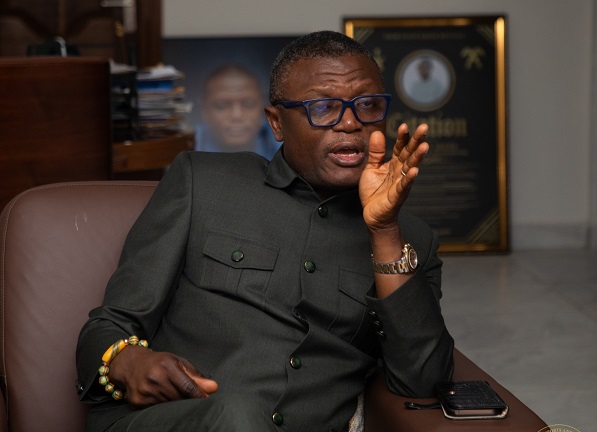When Kofi Iddie Adams took office as Ghana’s Minister for Sports and Recreation in February 2025, he stepped into one of the most urgent and complex challenges in the country’s sports development agenda.
He inherited a sector weighed down by underutilised stadiums, dilapidated sports complexes, and abandoned multimillion-cedi infrastructure projects.
These crumbling assets, once showpieces of national pride and sporting ambition, have now become costly reminders of mismanagement, neglect, and the absence of a strategic sustainability model.
At the heart of this crisis lies a glaring absence of sustainable funding models and strategic facility management reforms.
Fixing this broken system is no ordinary task—it demands visionary leadership, bold policy direction, and an unwavering commitment to transform Ghana’s sports infrastructure from financial burdens into engines of development and opportunity.
Missed opportunities
From the overgrown terraces of the Nyinahin Youth Resource Centre in the Ashanti Region to the locked gates of the Essipon Stadium in the Western Region, the evidence is overwhelming.
Facilities commissioned for major events like the 2008 Africa Cup of Nations (AFCON) and the 2023 African Games have not only failed to generate post-event utility but have also become symbols of wasted public investment.
The Essipon Stadium, for example, has been closed to the public for nearly three years due to disrepair. The Baba Yara and Cape Coast stadiums have suffered similar fates, with poor maintenance costing Ghana its CAF certification to host international games.
In Accra, the Borteyman Sports Complex, a flagship project from the 2023 Games, is facing a different kind of threat—land encroachment.
Out of 99 acres secured from the University of Ghana, only 43 remain uncontested. The rest have reportedly been taken over by private developers in just the last three months.
This is yet another example of how poor institutional control and lack of legal protection undermine state investment.
Meanwhile, the Koforidua and Ho Youth Resource Centres, financed through the National Youth Authority (NYA), have seen limited to no sporting activity since their commissioning, used instead for one-off national events like Independence Day parades. The financial and developmental opportunity cost is significant.
Broken model
Ghana’s facility management model—largely centralised under the NSA—is outdated and unsustainable.
Facilities are often left to the mercy of government subventions, with no revenue-generating strategy, no structured maintenance regime, and no accountability framework.
The dismissal of former NSA Director-General, Prof. Peter Twumasi, in 2024 was a response to growing frustration from sports stakeholders over the NSA’s inability to effectively manage and sustain the assets under its care. But replacing leadership is not enough; the entire system needs reform. The new leadership under Yaw Ampofo Ankrah, a former sports journalist and respected advocate, has a rare window of opportunity to reset the trajectory of sports infrastructure management. But that will require more than just passion and public goodwill. The NSA must be resourced, restructured, and empowered with private sector expertise to pursue commercialisation strategies, implement performance-based management systems, and adopt global best practices.
Business case for reform
Ghana’s economy cannot afford for sports facilities to be financial liabilities. Around the world, modern stadiums and sports complexes are being run like businesses, with diversified revenue streams from venue rentals, concerts, naming rights, co-working spaces, hospitality packages, sports academies, and retail outlets.
Such models not only ease the financial burden on the state but also create sustainable jobs, enhance tourism, and provide a vibrant ecosystem for youth and community development.
Ghana must benchmark against these self-sustaining models, leveraging public-private partnerships (PPPs) to drive investment, innovation, and accountability in the sector.
To achieve this, the Ministry of Sports and Recreation, through the NSA, must as a matter of urgency, initiate a nationwide Sports Facility Management Reform Plan, anchored on three pillars:
1. Legislation-backed policy reform to guide the usage, maintenance, and commercialisation of sports facilities;
2. Creation of autonomous facility management boards with private-sector representation and performance-based contracts; and
3. Completion and implementation of the Sports Fund to finance both infrastructure upkeep and future development.
If Ghana is to avoid repeating its past mistakes, these reforms must not be delayed.
Importantly, the minister must ensure the completion of work on the Sports Fund—a strategic financing vehicle designed to sustainably support infrastructure development and sports programming.
The Sports Fund, which was initiated by the Nana Akufo-Addo administration, was seen as a game-changer for financing Ghana’s sporting dreams. It was extensively worked on by experts but has since been shelved.
Its revival will provide a buffer against the unpredictability of annual budgetary allocations and unlock consistent capital for the maintenance, upgrading, and expansion of sports facilities.
Unleashing commercial value of sports
Ghana’s state-owned sports infrastructure across the country, when managed properly, has far-reaching economic benefits.
Beyond serving athletes, these venues can catalyse urban renewal, job creation, youth engagement, and local business development.
Globally, sports venues have been transformed into multi-purpose facilities, hosting concerts, trade expos, conferences, and community events, which generate millions in non-sports revenue.
Kofi Adams must spearhead the adoption of a similar playbook in Ghana. As the government looks to complete stalled Youth Resource Centres and considers building more stadiums, in line with President John Dramani Mahama’s vision to reset the country’s sports industry, it must also prioritise building business plans around each facility, turning them from cost centres into productive assets.
The nation can no longer afford to turn ambitious infrastructure projects into white elephants. Mr Adams and the NSA boss have an opportunity to change the course of history, but will require visionary leadership, bold reforms, and the right partnerships to succeed.
